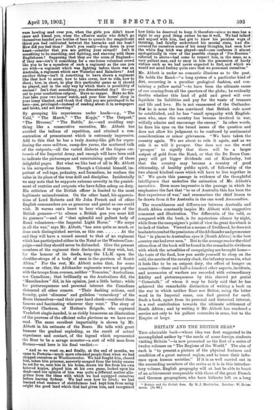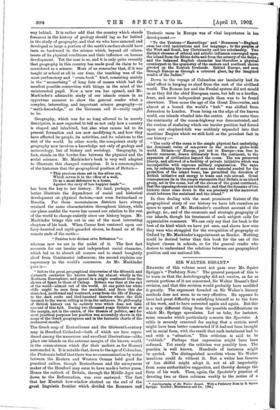BRITAIN AND THE BRITISH SEAS.*
Tats admirable book—whose idea was first suggested to its accomplished author by "the needs of some foreign students visiting Britain "—is now presented as the first of a series of twelve volumes on " The Regions of the World." The aim of each is " to present a picture of the physical features and condition of a great natural region, and to trace their influ- ence upon human societies." If it is as well carried out in the succeeding members of the series as it is in this introduc- tory volume, English geography will at last be able to boast of an achievement comparable with those of the great French and German geographers, who have hitherto left us a long • Britain and the British Seas. By IL J. Mackinder. London : W. Reims- mann. [7s. 61.1
way behind. It is rather odd that the country which stands foremost in the history of geology should lag so far behind in the study of geography, and that we who have annexed and developed so large a portion of the earth's surface should have been so backward in the science which, beyond all others, treats of its physical conditions and their influence on human development. Yet the case is so, and it is only quite recently that geography in this country has made good its claim to be considered as a science. Most of us remember that, if it was taught at school at all in our time, the teaching was of the most perfunctory and " cram-book " kind, consisting mainly in the "memorising" of long lists of names which had the smallest possible connection with things in the mind of the uninterested pupil. Now a new era has opened, and Mr. Mackinder's admirable study of our islands comes in an opportune moment to show the general reader what a complex, interesting, and important science geography—or "earth-knowledge," as the Germans call it—really ought to be.
Geography, which was for so long allowed to be merely descriptive, is now expected to tell us not only how a country is shaped and inhabited, but also what causes led to its present formation and are now modifying it, and how they have affected its people, its activities, and its relations to the rest of the world. In other words, the competent study of geography now involves a knowledge not only of geology and meteorology, but of history and sociology. Geography, in fact, stands on the border-line between the physical and the social sciences. Mr. Mackinder's book is very well adapted to illustrate this changed conception. It is a commonplace of the historian that the geographical position of Britain-
" This precious stone set in the silver sea, Which serves it in the office of a wall, Or as a moat defensive to a house, Against the envy of less happier lands"—
has been the key to her history. No land, perhaps, could better illustrate the dependence of social and historical development on physical factors,—not even Switzerland or Boeotia. For these mountainous districts have always retained the same characteristics throughout history, while our place amidst the waves has caused our relation to the rest of the world to change entirely since our history began. Mr. Mackinder brings this out in one of the most interesting chapters of his book. When Caesar first ventured upon our fairy-haunted and myth-guarded shores, he found us at the remote ends of the earth- " Penitus toto divisos orbs Britannos "- whereas now we are in the midst of it. The first fact accounts for our insular and independent racial character, which led us to absorb all comers and to stand haughtily aloof from Continental influences ; the second explains our supremacy in the world's commerce. As Mr. Mackinder puts it-
" Before the groat geographical discoveries of the fifteenth and sixteenth centuries the known lands lay almost wholly in the Northern Hemisphere, and spread in a single continent from the shores of Spain to those of Cathay. Britain was then at the end of the world—almost out of the world. At one point her white cliffs might be seen from the mainland, and from this she stretched, northward and westward, away from the life of Europe, to the dark rocks and bird-haunted skerries where the Celt listened to the waves rolling in from the unknown. No philosophy of British history can be entirely true which does not take account of this fact. During two thousand years Britain was at the margin, not in the centre, of the theatre of politics, and for most practical purposes her position was accurately shown in the maps of the Greek geographers and in the fantastic charts of the mediaeval monks."
The Greek map of Eratosthenes and the thirteenth-century map in Hereford Cathedral—both of which are here repro- duced among the numerous and excellent illustrations—alike place our islands on the extreme margin of the known world, in the ocean-stream which (for their makers as for Homer) surrounded it. It is notable that, down to the age of Columbus, the Ptolemaic belief that there was no communication by water between the Eastern and Western Oceans held good for practical sailors, though Eratosthenes and the anonymous maker of the Hereford map seem to have made a better guess. Hence the outlook of Britain, through the Middle Ages and down to the Reformation, was ever eastward. The fact that her Kentish bow-window abutted on the end of the great linguistic frontier which divided the Romance and
Teutonic races in Europe was of vital importance in he) development :— " To the Teutons—' Easterlings' and Norsemen '—England owes her civil institutions and her language ; to the peoples of the West and South, her Christianity and her scholarship. Two distinct streams of ethical and artistic influence converged upon the island from the Rhine delta and from the estuary of the Seine and the balanced English character has therefore a physicals counterpart in the symmetry of the eastern and southern shores pivoted on the Kentish forelands. Behind Europe, and seen through Europe as through a coloured glass, lay the imagined• wealth of the Indies."
Down to the voyage of Columbus our insularity had its chief effect in keeping us aloof from the rest of the civilised world. The Roman law and the Feudal system did not mould us as they did the chief European races, but left us a hardier, freer, and more independent people than was to be found elsewhere. Then came the age of the Great Discoveries, and almost at a bound the world's "hub" was shifted from Jerusalem to London. From being on the edge of the known world, our islands wheeled into the centre. At the same time the continuity of the ocean-highway was demonstrated, and the custom of seafaring which our insular position had forced upon our shepherd-folk was suddenly expanded into that
maritime Empire which we still hold as the proudest fact in our history :—
"The unity of the ocean is the simple physical fact underlying the dominant value of sea-power in the modern globe-wide world. Britain—of Europe, yet not in Europe—was free to devote resources, drawn ultimately from the continent, to the expansion of civilisation beyond the ocean. The sea preserved liberty, and allowed of a fertility of private initiative which was incompatible with supreme military organisation. The same sea, by reducing the reserve of men and material needed for the protection of the island home, has permitted the devotion of British initiative and energy to trade and rule abroad. Great consequences lie in the simple statements that Britain is an island group, set in the ocean, but off the shores of the great continent; that the opposing shores are indented ; and that the domains of two historic races come down to the sea precisely at the narrowest strait between the mainland and the island."
In thus dealing with the most prominent feature of the geographical study of our history we have left ourselves no
space to speak of Mr. Mackinder's excellent account of the geology, &c., and of the economic and strategic geography of our islands, though his treatment of each subject calls for appreciative comment. We can only say that his book is the best of its kind which we have yet seen, and shows how wise they were who struggled for the recognition of geography at Oxford by Mr. Mackinder's appointment as Reader. Nothing could be desired better than this book for the use of the highest classes in schools, or for the general reader who desires to understand the relations between our geographical position and our national life.











































 Previous page
Previous page